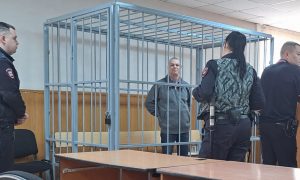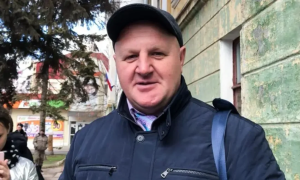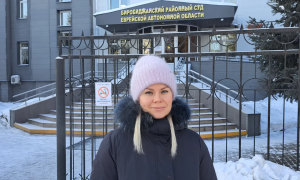Stanislav Kim could be jailed for up to three years if convicted of having “illegal” religious literature in his home in Urgench. In Bukhara, two Jehovah’s Witnesses were jailed for ten days and, with 28 others, fined for “illegal” literature and worship meeting.
Police in Urgench [Urganch] in Uzbekistan’s north-western Khorezm Region appear about to hand to court a criminal case against a local Baptist to punish him for “illegal possession” of religious literature in his home. Stanislav Kim could face up to three years’ imprisonment if convicted. The Investigator who prepared the indictment refused to tell Forum 18 if Nikolai Serin, another Baptist questioned as a witness in the case, also faces prosecution. Courts routinely punish people for “illegal” religious literature as well as holding meetings for worship.
Khorezm authorities also raided a Baptist worship meeting in February. In late March the host and her non-believing husband were fined for possessing “illegal” literature in their home when the meeting was raided.
Meanwhile in the southern Bukhara Region on 27 January, 30 Jehovah’s Witnesses were punished for meeting for worship and possessing religious literature officials claimed was “illegal”. They received fines totalling more than 1,050 times the minimum monthly wage or 136,752,000 Soms (390,000 Norwegian Kroner, 42,000 Euros or 47,000 US Dollars at the inflated official exchange rate). Two of the Jehovah’s Witnesses – Andrei and Yelena Yu – were fined 30 times the minimum monthly wage each and given 10-day jail terms for exercising their freedom of religion and belief.
Against its international human rights obligations, Uzbekistan imposes strict censorship on all religious publications and all aspects of their distribution. There is a de facto ban on religious literature of any faith in homes and if found such literature is frequently ordered to be destroyed. State pressure is so great that for their own safety some religious believers have destroyed their own sacred texts (see Forum 18’s Uzbekistan religious freedom survey http://www.forum18.org/archive.php?article_id=1862).
Imprisonment for religious literature?
On 27 June Investigator Lieutenant Sarvar Artykov of Urgench City Police in Khorezm Region prepared and signed the indictment (seen by Forum 18) against local Baptist Stanislav Kim. He is accused of “illegal possession” of Christian literature under Criminal Code Article 244-3.
Article 244-3 punishes “Illegal production, storage, import into the territory of Uzbekistan with a purpose to distribute or distribution of religious materials, committed after enforcement of an administrative penalty for a similar violation” with a fine of 100 to 200 times the minimum monthly wage or corrective labour of up to three years.
“The Investigator warned us that Stanislav might be fined or even jailed for up to three years,” Nikolai Serin, Kim’s fellow-Baptist from Navoi Region, told Forum 18 on 27 June. Police told Serin and Kim that Urgench City Court will hear the case in up to fifteen days (by about 10 July), Serin added.
Both Kim and Serin are members of separate Council of Churches Baptist congregations. Council of Churches Baptist churches do not – as Uzbekistan against its human rights obligations requires – seek state permission to exist (see Forum 18’s Uzbekistan religious freedom survey http://www.forum18.org/archive.php?article_id=1862).
Urgench Police questioned Serin on 26 June as a witness in the case, he noted. On 19 June Police in Navoi had already raided his home there and confiscated his Christian books. Navoi Police told him that a case had been opened against him under Administrative Code Article 184-2, which punishes “Illegal production, storage, import or distribution of religious materials” with a fine for individuals of 20 to 100 times the minimum monthly wage, as well as confiscation of the materials and any equipment used to produce them.
“We’ve done nothing criminal, but only exercised our Constitutional rights which allow us peacefully to practice our faith, which does no harm to anyone,” Serin insisted to Forum 18. He said that when he told Investigator Artykov, who is leading the case, that he refuses to be a witness, the Investigator warned him that “I also may be punished with up to three years’ imprisonment unless I cooperate with the Police.”
Serin did not sign any Police reports or statements prepared by Urgench Police during questioning either on 17 May or 26 June, he told Forum 18.
“Extremist”?
Investigator Artykov argues in the 27 June indictment that the materials found in Kim’s home “contain ideas of converting believers of one confession to another, which is against Article 5, Part 3 of the Religion Law”. He concludes therefore that Kim “stored illegal religious materials in his private flat”.
The indictment says that among the items officers seized from Kim was a Russian-language book “To Mecca”, which “propagates the Protestant religion”. The book is a “testimony of a former [non-Uzbek] Muslim man who became a Christian”, Serin told Forum 18. He confirmed that Kim had a copy.
The “expert analysis” by the government’s Religious Affairs Committee says that the book “does not contain ideas against Uzbekistan’s Constitutional order, or of an extremist or separatist nature”. But it claims that the book “can be used for missionary purposes”, Serin noted.
Arslan Ruzimov, Chief of Khorezm Regional Police Criminal Investigation Department, adamantly defended the charges against Kim. Asked on 28 June why the authorities want to imprison him, he told Forum 18 from Urgench: “The religious expert analysis found the materials confiscated from Kim to be extremist.”
Told that the confiscated literature consisted of Christian magazines, children’s stories, song-books and Kim’s personal notes, and asked what specifically is “extremist” in those materials, Ruzimov could not answer. “They have a lawyer, they can ask him to defend them,” he retorted. Asked why Serin was pressured to be a witness against Kim, his co-believer, he did not answer. He then declined to talk to Forum 18.
Investigator Artykov also used a July 2001 conviction in a non-religious criminal case to justify the unrelated new case. Kim was sentenced that year to 20 years’ imprisonment as an alleged accomplice in an intentional killing. Artykov argues that although Kim was freed from his sentence, “he continued violating the Law”.
Serin told Forum 18 that Kim was released from prison in 2009, and that “he became a believer while in prison.” He said that “it looks like the authorities want to imprison him again, which is why they bring up his criminal conviction from the past in the indictment.”
Investigator Artykov told Forum 18 on 28 June that the case against Kim has not yet been handed to the Court, but refused to answer Forum 18’s other questions. Asked whether any charges were brought against Serin, as well as why a criminal case was opened against Kim simply for having Christian books and materials in his home, Artykov replied: “If you want to know the answers then send your representative to our office. I will not answer your questions over the phone.” Artykov also did not say when the Police will refer the case to the Court.
Why criminal charges?
The indictment explains that police opened a criminal case against Kim because this is the second case against him within one year for possessing “illegal” religious literature.
Urgench City Criminal Court fined Kim ten times the minimum monthly wage, 1,184,000 Soms, on 8 August 2015 under Administrative Code Article 184-2, according to the June 2016 indictment. The Court ordered part of the Christian literature confiscated from him to be destroyed and the rest to be handed over to the Khorezm Department of the state-backed Muslim Board.
The fine followed a 20 July 2015 raid on Kim’s home (see F18News 6 August 2015 http://www.forum18.org/archive.php?article_id=2087).
Secret police and anti-terrorism police raid and confiscations
The latest trouble began for Kim on 17 May, when Major Shukhrat Masharipov of Urgench Anti-Terrorism Police and two unidentified officers raided his home in the city, Serin told Forum 18. The indictment indicates that the two officers represented the National Security Service (NSS) secret police. The officers pretended to be conducting a passport inspection.
Without showing a search warrant, officers confiscated Christian literature, including the book “To Mecca”, one copy each of “Herald of Truth” magazine, two Baptist song books (“Hold on to Christ” and “Youth for Christ”), a book of Christian children’s stories, and several notebooks with personal notes.
Serin told Forum 18 that he was present during the Police raid on Kim’s home, since he happened to be visiting him that day.
Six hour interrogation
Officer Masharipov and the other officers took Kim’s and Serin’s passports and left, demanding that the two appear at Urgench Police Station the next morning.
On 18 May, Major Masharipov and Police Investigator Shavkat Bekjanov questioned the two Baptists for six hours, Serin told Forum 18. “They suggested that we write statements but we refused.” The Police told the Baptists that as Kim had been found for the second time “illegally possessing” Christian literature in his home, this time he may be jailed. The two were released from the Police Station that evening.
February Khorezm raid and fines
On 17 February in Gullanbog, in Yangiaryk District of Khorezm Region, two plain-clothes Anti-Terrorism Police officers and the local ordinary police officer raided the home of Oybek and Gulnara Rahimov as 15 Council of Churches Baptists were meeting for worship.
“When the local police officer saw we were worshipping, he called for a police squad,” Baptists told Forum 18 on 15 April. Police then began filming those present and took down their names. Police also confiscated a Bible, a children’s Bible, one other Christian book and two Baptist song-books.
All the meeting participants were taken to Yangiaryk District Police Station, where they were questioned for three hours.
Oybek Rahimov is not a Baptist and was not at home during the raid. But that did not stop Judge Yerpolat Berdiyev, Chair of Bogot District Criminal Court, on 22 March fining both wife and husband 10 times the minimum monthly wage each. Baptists have particularly expressed outrage at the fine imposed on Oybek.
Judge Berdiyev also ordered the destruction of Christian literature confiscated from the Rahimovs’ home. Courts frequently order that such confiscated religious literature be destroyed (see Forum 18’s Uzbekistan religious freedom surveyhttp://www.forum18.org/archive.php?article_id=1862).
Asked why the Baptists were raided, Bogot District Police on 8 June referred Forum 18 to Anti-Terrorism Police officer Dilshot Fayzullayev. However, asked the same day why officers conducted the raid, fines and confiscations, he refused to answer.
Neither Bogot District Court, nor Judge Berdiyev, answered their phones on 9 June.
Two short-term prisoners of conscience, 30 large fines
Meanwhile, in Kogon in Bukhara [Bukhoro] Region on 27 January, 30 Jehovah’s Witnesses received fines totalling more than 1,050 times the minimum monthly wage or 136,752,000 Soms (390,000 Norwegian Kroner, 42,000 Euros or 47,000 US Dollars at the inflated official exchange rate). Two of the Jehovah’s Witnesses – Andrei and Yelena Yu – were fined 30 times the minimum monthly wage each and given 10-day jail terms for exercising their freedom of religion and belief.
The fines and jailing of the two prisoners of conscience followed an early January raid by Kogon Anti-Terrorism Police and the ordinary police on the home of Aziz Pulatov. Jehovah’s Witnesses were meeting together for worship, they told Forum 18 on 8 June.
Numon Tukhtayev, Deputy Head of Kogon Anti-Terrorism Police, refused on 8 June to explain why the raid took place. The same day the ordinary police similarly refused to explain their actions.
Judge Zarif Sherov, Chair of Kogon Criminal Court, found the accused guilty under Administrative Code Articles 184-2 (“Illegal production, storage, or import into Uzbekistan, with the intent to distribute or actual distribution, of religious materials by physical persons”) and Article 240 (“Violation of the Religion Law”), Part 1 (“Carrying out of unauthorised religious activity, evasion by leaders of religious organisations of registration of the charter of the organisation, the unauthorised organisation and conduct of worship by religious ministers, and the organisation and conduct of special children’s and youth meetings, as well as vocational, literature and other study groups not relating to worship”).
Aziz Pulatov and Fazliddin Tukhtayev were fined 100 times the minimum monthly wage each; Akpar Pulatov, Shahzoda Pulatova, Mukaddas Rakhmatova, Zuhra Tashayeva, and Malyuda Kuldasheva were fined 50 times the minimum monthly wage each; Shahnoz Gulomova, Shahzoda Mavlyanova, Mukhabbatkhon Mirzayeva, Mokhidil Zairova, Gulnora Norova, Dilfuza Kobilova, Orom Khaydarova, Soliya Niyazova, Mahliyo Zhurayeva, Ibodillo Zhurayev, Gulchehra Ibadova, Shoista Mamedova, Shahin Norov, Zarina Kosimova, Munavvar Mardonova, Azamzhon Ismatilloyev, Farida Amonova, and Zarina Amonova were fined 30 times the minimum monthly wage each; and Gulbahor Mavlonova, Nilufar Ibrohimova, and Mizhgona Ismatillayeva were fined 5 times the minimum monthly wage each.
Judge Sherov denied that he had jailed prisoners of conscience Andrei and Yelena Yu. “I do not know about the jailing,” he claimed to Forum 18 on 9 June.
However, the Judge admitted that he had imposed fines totalling 1,050 times the minimum monthly wage. Asked why he did this to people exercising their freedom of religion and belief, Sherov stated: “I explained to them during the hearing that the fines were given based on the existing law.”
Asked about the restrictions the Religion Law, Administrative and Criminal Codes put on the exercise of freedom of religion and belief, the Judge replied: “I cannot comment on that”. He then said “let them appeal if they do not agree with our decision” before declining to talk further to Forum 18. (END)





